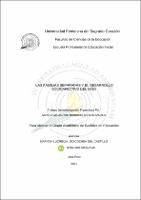| dc.contributor.advisor | Goicochea Del Castillo, Maritza Lucrecia | |
| dc.contributor.author | Barrionuevo Oliveros, Mirela Milagros | |
| dc.date.accessioned | 2021-07-05T17:54:32Z | |
| dc.date.available | 2021-07-05T17:54:32Z | |
| dc.date.issued | 2021 | |
| dc.identifier.uri | http://hdl.handle.net/20.500.11955/819 | |
| dc.description.abstract | En la actualidad, se puede observar que las familias optan por separarse cuando ocurren dificultades o problemas que ya no tienen solución. Esta situación no solo les afectará a ellos, sino también a sus hijos, provocando daños en el aspecto social y afectivo de su desarrollo, dependiendo de la edad que tenga el infante, es por ello que diversos autores como Piaget, Bandura y Wallon dentro de sus especialidades abordan la importancia del desarrollo socioafectivo y establecen una relación del desarrollo afectivo del niño como ser social mediante la interacción con el medio para que su desenvolvimiento, personalidad, actitudes y conductas sean las más adecuadas y pueda tener una inserción estable a futuro. Un ser humano emocionalmente estable será capaz de expresar sus emociones e intereses, mostrando seguridad en sí mismo, capaz de autorregularse, respetarse, y valorarse, gracias a ello la persona podrá lograr potenciar al máximo todas sus capacidades. | es_PE |
| dc.description.abstract | Currently, it can be observed that families choose to separate when difficulties or problems occur that no longer have a solution. This situation will not only affect them, but also their children, causing damage in the social and affective aspect depending on the age of the infant, which is why various authors such as Piaget, Bandura and Wallon within their specialties address the importance of socio- affective development and establish a relationship of the affective development of the child as a social being through interaction with the environment so that their development, personality, attitudes and behaviors will be the most appropriate and can have a stable insertion in the future. An emotionally stable human being will be able to express their emotions and interests, showing self-confidence, capable of self-regulation, respect, and value, thanks to this the person will be able to maximize all their abilities. | es_PE |
| dc.description.uri | Trabajo de investigación | |
| dc.format | application/pdf | es_PE |
| dc.language.iso | spa | es_PE |
| dc.publisher | Universidad Femenina del Sagrado Corazón | es_PE |
| dc.rights | info:eu-repo/semantics/openAccess | es_PE |
| dc.rights.uri | https://creativecommons.org/licenses/by-nc-nd/4.0/ | es_PE |
| dc.source | Repositorio Institucional - UNIFÉ | |
| dc.subject | Prácticas de crianza | |
| dc.subject | Familia | |
| dc.subject | Padres separados | |
| dc.subject | Desarrollo socioafectivo | |
| dc.subject | Parenting practices | |
| dc.subject | Family | |
| dc.subject | Separated parents | |
| dc.subject | Socio-affective development | |
| dc.subject | Educación--Trabajo de Investigación | |
| dc.title | Las familias separadas y el desarrollo Socioafectivo del Niño | es_PE |
| dc.type | info:eu-repo/semantics/bachelorThesis | es_PE |
| thesis.degree.name | Bachiller en Educación | es_PE |
| thesis.degree.grantor | Universidad Femenina del Sagrado Corazón. Facultad de Ciencias de la Educación | es_PE |
| thesis.degree.level | Bachiller | es_PE |
| thesis.degree.discipline | Educación Inicial | es_PE |
| dc.subject.ocde | https://purl.org/pe-repo/ocde/ford#5.03.01 | es_PE |
| renati.advisor.dni | 07773705 | |
| renati.advisor.orcid | https://orcid.org/0000-0001-5856-224X | es_PE |
| renati.author.dni | 71873552 | |
| renati.discipline | 111016 | es_PE |
| renati.juror | Goicochea Del Castillo, Maritza Lucrecia | es_PE |
| renati.juror | Melloh Navarro, Patricia Dorotea | es_PE |
| renati.level | http://purl.org/pe-repo/renati/level#bachiller | es_PE |
| renati.type | http://purl.org/pe-repo/renati/type#trabajoDeInvestigacion | es_PE |
| dc.publisher.country | PE | es_PE |


